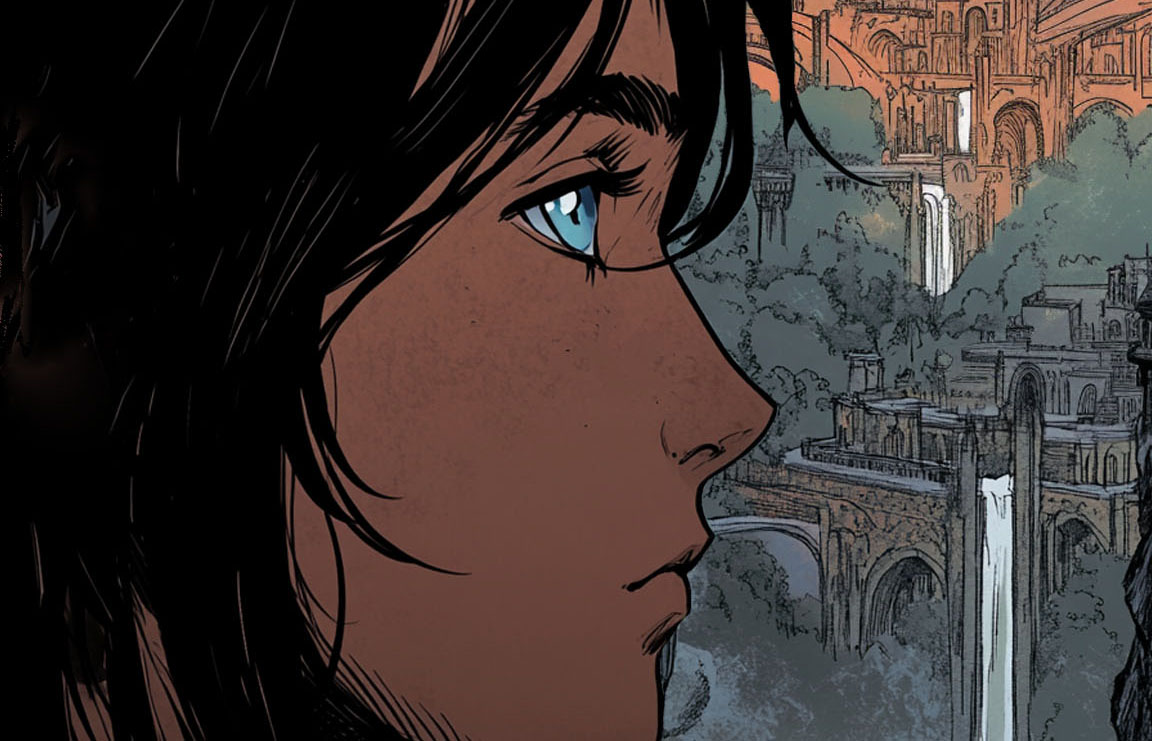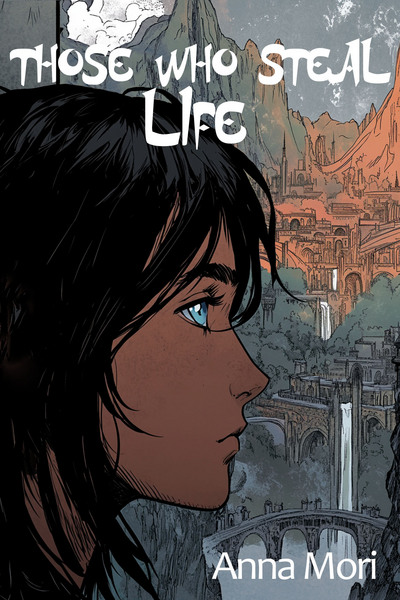The Council chamber had barely changed since the first time Lyn had set foot there. Dark columns rose toward the vaulted ceiling, and the walls — beneath their gilded mosaics — were lined with maps of Bizanth and its neighboring states. A massive marble table stood in the center, scattered with documents, oil lamps casting their flickering glow over the tense faces of the Council members.
The Archon's attire, still a blood-red, had taken on a slightly more dignified look compared to the reckless days of Lyn’s youth. But in all other respects, he hadn't changed one bit — lounging in his chair, boots propped up on the table just to see if anyone would dare call him out for it.
No one did.
Not until Valeria entered the room, settled gracefully into the carved wooden throne at the head of the table, and said, almost warmly:
“Make yourself comfortable, dear Archon. Would you like some slippers? A foot massage, perhaps? I wasn’t informed that was on today’s agenda.”
With a sigh, he lowered his feet to the floor and assumed a somewhat more respectable posture. He was in for an excruciatingly dull few hours.
Lyn felt stuck, caught between his old homeland and his new one, between Aryan and Bizanth — like being torn between a charming lover and a bloated, insufferable husband.
Well. If that were actually the case, at least there wouldn’t be this damn sense of duty keeping him from cutting ties and running for good.
And honestly, what a stupid, overused metaphor. Why not be torn between a charming lover and an equally charming husband? Maybe even quite literally, in a nice, spacious bed…
That thought entertained him just enough to keep him from screaming into the void while he sat through yet another Council meeting, teetering between boredom and the creeping dread that, sooner or later, he’d have to actually do something.
Like, say.
Become a mass murderer.
Because, as usual, the conversation circled back to the same topic.
“We can’t keep ignoring the threat,” Julius was saying, voice tense. “Their territory is expanding at an alarming rate. Look at these maps! Where independent cities stood just yesterday, today there are garrisons of Arabiya troops—”
Once a privileged rich boy, Julius had matured and — Lyn’s opinion — grown full of himself, now fancying himself the real commander of the world’s greatest army.
“But they are not at war with Bizanth,” Patroclus countered, calm as ever.
The Grand Logothete was aging. His eyes were sunken, his hands sometimes trembled, but his speech remained steady — and, Lyn hoped, so did his mind.
“For now,” Theodor, the current head of the Church, cut in icily. To Lyn, he seemed barely different from his old acquaintance, Xenophon. “We must act preemptively, before they become too strong. Or would you rather wait until they’re so powerful that resisting them becomes impossible? Was it not enough that they took Alexandria and Damascus — the holy city where the Apostle Paul first believed in Isa?” He crossed himself. “We should have fought to reclaim our sacred lands long ago—”
“Damascus fell fifty years ago,” Patroclus interrupted dryly. “And since the Red Emperor came to power, the Arabiya haven’t even approached our borders. Also, let me remind you: we are a secular state, and in this chamber, we deal in logic, not calls to arms in the name of one god or another.”
Theodor turned red but said nothing. Xenophon wouldn’t have let that slide. A pleasant change, at least — less power in the hands of the clergy.
“But look,” Liora joined in, “look at the laws they enforce in the lands they conquer. Their rule is monstrous, their religion crushes all freedom. People suffer under them! They destroy old customs, raze temples, impose their will with fire and sword. Are we supposed to stand by and watch? This is the decline of civilization — the end of days! Is it not our duty to protect those who suffer? If you saw a cruel boy tormenting a cat in the street, would you not step in?”
One significant change had come to the Council: now there were ten chairs instead of nine. Valeria had split the duties of the Logothete of Roads and the Magisterium. Liora, a shifter and a woman, had become the head of the Magisterium — a double victory for Valeria. Though, judging by her expression right now, she wasn’t exactly celebrating. She remained silent, waiting for everyone to speak their piece. But Lyn had no doubt — she was against the war. And she was probably furious that Liora was advocating for it.
“You know the problem with metaphors, Lady Liora?” Patroclus said. “They tend to conceal inconvenient truths. To save a cat from a street boy, you don’t need to send tens of thousands of people to die. If you personally wish to help the people of those conquered cities — by all means, go right ahead. No? Then spare us the theatrics. No one here actually gives a damn about the freedom of oppressed peoples. What they’re afraid of is the end of our empire’s grandeur. But let’s not exaggerate — it’s hardly the end of civilization.” He smirked. “At worst, it’s the end of Bizanth. And honestly, the world could survive that just fine.”
“Well, since we’re being blunt,” said Severian, the current Eparch of the Great City, “trade with Arabiya-occupied territories has suffered immensely. War isn’t exactly my domain, but I’d say I’m in favor of it. We’re losing money.”
“If you’re about to argue that a long, grueling war will somehow be more profitable, I’m going to assume someone here is senile — and it’s not me,” Andromache shot back. She was still the Logothete of the Treasury. “At the very least, the Arabiya allow their conquered cities to continue trade with us.”
“But they clearly don’t want peace,” Julius pointed out. “We’ve tried diplomacy — they won’t even receive our envoys—”
“And so what? A bad peace is still better than a formal declaration of war…”
“The soft-heartedness of you people…,” Constantine sneered, his lip curling with undisguised contempt. “Go ahead, preach peace and friendship all you want — but those Arabiya bastards? They don’t give a damn about your peace. They only understand strength. If you don’t have it, they’ll slit all our throats before we can blink. One moment of weakness, and it’s all over. That’s why women — pah, excuse me, ladies — should stay the hell out of men’s business when it comes to war.”
Lyn caught the quick, seething glance Valeria shot Constantine before her face smoothed back into its usual unreadable calm. He sometimes wondered if she was sleeping with the guy. Probably not — he was repulsive, with that pompous bravado and that scraggly excuse for a beard. Lyn liked to think she was still loyal to Justin, out of sheer camaraderie. But Constantine had been orbiting her for years, practically salivating, and while Valeria didn’t exactly encourage him, she never quite shut him down either.
Well. After that look she just gave him, Lyn was willing to bet he wasn’t getting lucky anytime soon.
What really mattered, though, was that five out of ten Council members had already voiced their support for war. And that was bad.
“Just a little reminder,” Lyn drawled, pretending to examine his nails, the very picture of someone who’d wandered into the Council chamber by accident, “Athena, goddess of military strategy? A woman. Ares, meanwhile, is responsible for mindless bloodshed. Maybe that’s because women tend to keep their heads in a crisis. And don’t have this weird habit of waving a stick at the neighbor just ‘cause the neighbor looks too damn cool. And what if he actually is cool? What if he takes that stick and shoves it right up your ass? But for some reason, men never seem to think that far ahead. Or maybe that’s exactly what they want…”
Valeria’s smile was pale but genuine.
“Well, in that case,” she said smoothly, “let’s hear from our Logothete of the Roads. How cool exactly is our neighbor? Does our intelligence have anything new to report?”
The man who had taken Belisarius’ place was called Stephan. Valeria had appointed him for a reason, presumably, but Lyn couldn’t see what that reason was. The guy was as unimpressive as they came.
“Not much,” Stephan mumbled. He and Valeria were the only ones left who hadn’t stated their position on war. “We still don’t know nearly enough. The heart of their lands is completely closed off to outsiders. Getting in is difficult. Getting out is even worse. As for the conquered territories… There’s no big secret there — the Arabiya control everything, tolerate no dissent. They hate magic and wipe out anyone who practices it. Somehow, they can sense when it’s used — and they’re very efficient about it. But we haven’t been able to find any devices or organizations similar to our Magisterium that would explain how they do it… At least not in the areas where our spies can reach.
But even though they supposedly don’t use magic at all, there are rumors…” He hesitated. “Rumors about their Caliph’s immortality. That he’s a living god on earth. That his generals never die either. That he rewards his most loyal warriors with eternal life. This belief makes the Arabiya forces utterly relentless in battle — and it inspires so much terror in their enemies that some don’t even bother resisting conquest.”
“So, to summarize,” Lyn said, stretching lazily, “we have no fucking clue how strong Arabiya actually are or why they keep winning. All we see are the results — conquered land, crushed armies. If we go in blind, we’re in for a world of hurt.”
“Well, this is a first — the Archon against war, and all because he’s afraid,” Theodor remarked with poisonous sweetness.
“And what’s your excuse?” Lyn raised a brow. “What makes you pretend this is some holy crusade? Let me guess — greed? You’re hoping that war panic will make people donate more to the church? Or that a fresh batch of pretty young boys will flock to your monasteries to dodge the draft?”
To Lyn’s surprise, Theodor didn’t even attempt to play the innocent.
“So what, our saint is afraid of a foreign god now?” His voice was smooth as silk. “And here I thought you always preached that gods don’t exist.”
“Of course, they don’t exist,” Lyn said flatly, unsure where Theodor was going with this. “There’s only a bunch of cunning bastards in power who use fairy tales to get what they want. ‘Let’s slaughter everyone who doesn’t believe in our god because we need more money and land!’ or ‘Oh no, our empire is going to shit, let’s sic the mob on some heretics and let them vent their frustration that way.’ Hopefully, everyone here remembers the Red Emperor well enough to see my point.”
“Yes, yes, we’ve all heard that speech before,” Theodor waved a hand dismissively. “But if there are no gods, then Bizanth has nothing to fear, does it? Arabiya is just made up of men, and that means our army can handle them.”
“It doesn’t take a god to wipe out an army. All it takes is a bad plan,” Lyn snapped back. He could tell he wasn’t sounding particularly convincing.
“…And we don’t hunt heretics anymore,” Theodor continued, unfazed. “With magic users on our side, the army of Bizanth is stronger than ever—”
“Exactly,” Liora cut in. “If Arabiya refuses to use magic, that only puts them at a disadvantage. If war comes, we have nothing to fear.”
“…And of course, we have you, dear Archon,” Theodor added smoothly.
“I’m not a god,” Lyn said icily. “There are simply things in this world we haven’t studied yet. That’s all.”
“…Even if you refuse to call your power divine.”
Theodor had trapped him. Somehow, the discussion had been twisted into a debate over whether it was safe to attack Arabiya — as if that was the only concern — when in reality, there were dozens of reasons why this war — any war — was a terrible idea. And now, thanks to his own big mouth, Lyn had let the argument be framed on Theodor’s terms.
Well. Shit.












Comments (0)
See all